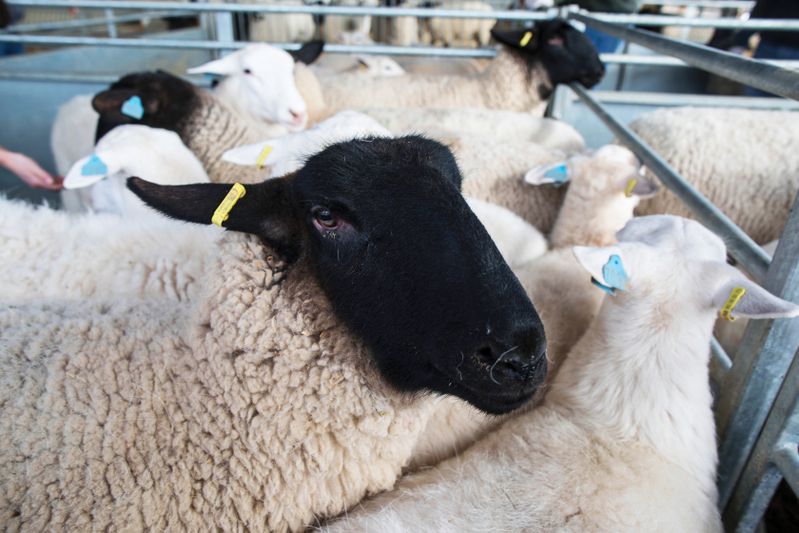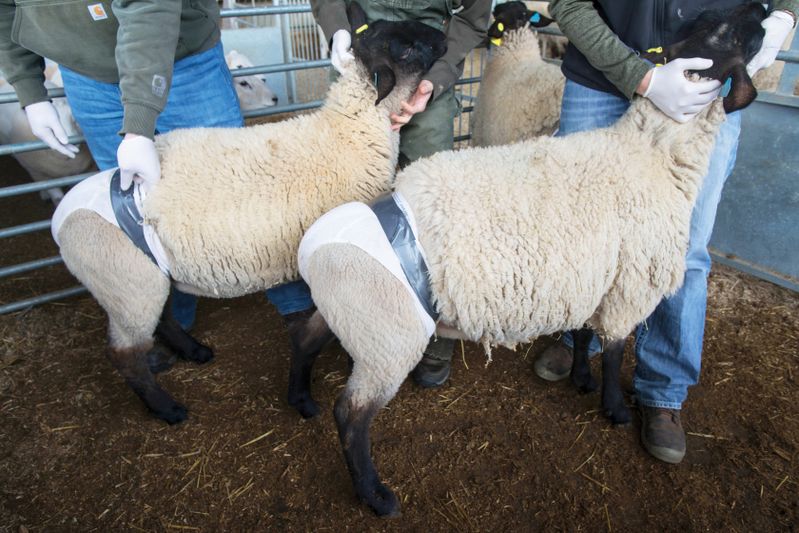WRITTEN BY BENYAMIN COHEN
PHOTOGRAPHED BY RAYMOND THOMPSON JR.
Professor Scott Bowdridge has spent his entire adult life studying a parasite killing sheep.
He may have just figured out how to stop it.
Once every few months, Scott Bowdridge walks into a Walmart and purchases packs of men’s underwear. The white briefs are not for him. They’re for the sheep.
It seems with Bowdridge, everything comes back to sheep.
The 42-year-old West Virginia University professor grew up on a small sheep farm in Southern California, located in the desert between L.A. and Las Vegas. He taught high school agriculture classes. He ran a nonprofit rare breeds farm in Maine for the man who invented the Ethernet.
He studied sheep at Cal State Chico, the University of Maine, Virginia Tech and the Rutgers New Jersey Medical School before arriving at WVU in 2011 as an associate professor in the Davis College of Agriculture, Natural Resources and Design.
He paid his way through college by shearing sheep. To this day, he still enters sheep shearing contests at state fairs. “My dad taught me how to shear,” he says with a smile. “It’s something I got in my blood, and can’t really get rid of.”
But it’s something in the blood of the sheep he studies that has truly captured his imagination for more than a decade. One of the most prolific causes of death in America’s sheep population is a parasite called Haemonchus contortus. Shaped like a barber pole, this lethal worm pierces the animal’s stomach and feeds on its blood. But scientists have figured out a potential way to stop this clever vampire. And Bowdridge is at the forefront of this project.

On a recent Wednesday afternoon, he is — where else? — at WVU’s Animal Science Farm. On its picturesque 935 acres live all manner of creatures including 200 sheep. An additional 200 are arriving in Morgantown this summer. Driving up the hill in his Ford F-150, he hops out looking like the academic farmer he is: boots, jeans and a gold WVU V-neck sweater.
He saunters into what appears to be a typical barn but is actually a high-tech laboratory. Each sheep is labeled with a barcode tag on its ear. Scan it and that sheep’s complete medical history pops up on a screen. The sheep are cordoned off from grazing outside, where they could potentially pick up the deadly parasite. Instead, Bowdridge serves them a high-quality diet of feed.
The key ingredient to his plan is the purebred St. Croix sheep from the U.S. Virgin Islands. The beautiful all-white creatures have somehow developed a resistance to this parasite. Infect a St. Croix sheep with this disease and they brush it off like the common cold. In short order, it just leaves their system. If Bowdridge can figure out the genetic marker that allows St. Croix to be immune from this parasite, he could help the entire sheep population of America.
Which brings us to the sheep in men’s underwear from Walmart. Bowdridge bought them a size large and they keep sliding off. So now they’re secured to the sheep’s waistline with a mess of silver duct tape. It looks like something a Mountaineer MacGyver might have come up with.
The professor needed a way to collect feces from the sheep in the barn while still keeping a relatively clean environment. Hence the underwear. One of his students drew the short straw and it’s now their job to detach the underwear and bring the feces back to the lab on the Evansdale section of campus.

At the mention of the lab, Bowdridge whips out his iPhone and shows a visitor a video he took of one of the parasites. They were able to extract it from an infected sheep and actually keep the parasite alive so they could study it. It looks like a mini-octopus, arms wriggling in all directions. They’ve discovered things about this blood-sucking parasite that no one else in the world has seen. WVU is sending what it learns to the National Sheep Improvement Program with the goal of figuring out a genetic predictor for parasite resistance.
Bowdridge, who’s married to a fellow WVU researcher and has two daughters, wants to give back. Sure, what he discovers will help sheep all across the country. But, specifically, he wants to be able to help one person in particular — his father, who still runs a sheep farm in California and occasionally calls about sick sheep back at the homestead. “I help my dad,” Bowdridge says. “Whatever I can do to make it just a little bit easier. That’s the goal.”
Studying sheep stomachs may seem strange to some, but to Bowdridge, it just doesn’t get any better. “I love what I do,” he says peering over into the pen. “This is why we came here.”
PHOTOGRAPHED BY RAYMOND THOMPSON JR.
Professor Scott Bowdridge has spent his entire adult life studying a parasite killing sheep.
He may have just figured out how to stop it.
Once every few months, Scott Bowdridge walks into a Walmart and purchases packs of men’s underwear. The white briefs are not for him. They’re for the sheep.
It seems with Bowdridge, everything comes back to sheep.
The 42-year-old West Virginia University professor grew up on a small sheep farm in Southern California, located in the desert between L.A. and Las Vegas. He taught high school agriculture classes. He ran a nonprofit rare breeds farm in Maine for the man who invented the Ethernet.
He studied sheep at Cal State Chico, the University of Maine, Virginia Tech and the Rutgers New Jersey Medical School before arriving at WVU in 2011 as an associate professor in the Davis College of Agriculture, Natural Resources and Design.
He paid his way through college by shearing sheep. To this day, he still enters sheep shearing contests at state fairs. “My dad taught me how to shear,” he says with a smile. “It’s something I got in my blood, and can’t really get rid of.”
But it’s something in the blood of the sheep he studies that has truly captured his imagination for more than a decade. One of the most prolific causes of death in America’s sheep population is a parasite called Haemonchus contortus. Shaped like a barber pole, this lethal worm pierces the animal’s stomach and feeds on its blood. But scientists have figured out a potential way to stop this clever vampire. And Bowdridge is at the forefront of this project.
BOWDRIDGE STUDIES TEXEL AND KATAHDIN SHEEP AS WELL AS THE ALL-WHITE ST. CROIX SHEEP, WHICH MAY HOLD THE KEY TO MAKING OTHER BREEDS RESISTANT TO THE PARASITE THREATENING THE COUNTRY’S SHEEP.
On a recent Wednesday afternoon, he is — where else? — at WVU’s Animal Science Farm. On its picturesque 935 acres live all manner of creatures including 200 sheep. An additional 200 are arriving in Morgantown this summer. Driving up the hill in his Ford F-150, he hops out looking like the academic farmer he is: boots, jeans and a gold WVU V-neck sweater.
He saunters into what appears to be a typical barn but is actually a high-tech laboratory. Each sheep is labeled with a barcode tag on its ear. Scan it and that sheep’s complete medical history pops up on a screen. The sheep are cordoned off from grazing outside, where they could potentially pick up the deadly parasite. Instead, Bowdridge serves them a high-quality diet of feed.
The key ingredient to his plan is the purebred St. Croix sheep from the U.S. Virgin Islands. The beautiful all-white creatures have somehow developed a resistance to this parasite. Infect a St. Croix sheep with this disease and they brush it off like the common cold. In short order, it just leaves their system. If Bowdridge can figure out the genetic marker that allows St. Croix to be immune from this parasite, he could help the entire sheep population of America.
Which brings us to the sheep in men’s underwear from Walmart. Bowdridge bought them a size large and they keep sliding off. So now they’re secured to the sheep’s waistline with a mess of silver duct tape. It looks like something a Mountaineer MacGyver might have come up with.
The professor needed a way to collect feces from the sheep in the barn while still keeping a relatively clean environment. Hence the underwear. One of his students drew the short straw and it’s now their job to detach the underwear and bring the feces back to the lab on the Evansdale section of campus.
A GRADUATE STUDENT IS TASKED WITH BRINGING FECES SAMPLES, COLLECTED IN MEN’S UNDERWEAR ON THE SHEEP, TO THE LAB FOR STUDY.
Bowdridge, who’s married to a fellow WVU researcher and has two daughters, wants to give back. Sure, what he discovers will help sheep all across the country. But, specifically, he wants to be able to help one person in particular — his father, who still runs a sheep farm in California and occasionally calls about sick sheep back at the homestead. “I help my dad,” Bowdridge says. “Whatever I can do to make it just a little bit easier. That’s the goal.”
Studying sheep stomachs may seem strange to some, but to Bowdridge, it just doesn’t get any better. “I love what I do,” he says peering over into the pen. “This is why we came here.”
